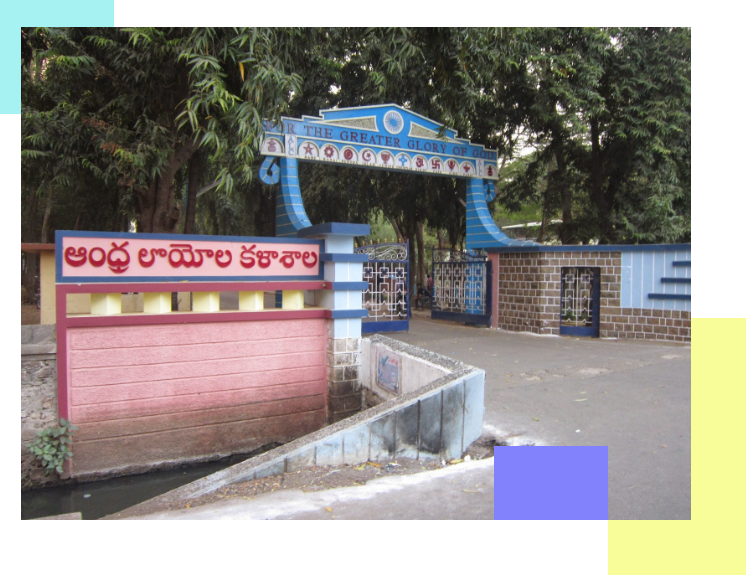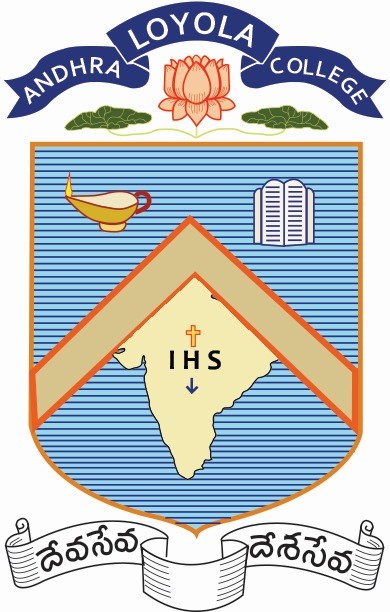ORIGIN
Andhra Loyola College is a Jesuit College in Vijayawada,
the second biggest city in
Andhra
Pradesh.

Andhra Loyola College (Autonomous), Vijayawada, is a Catholic Christian Higher Educational
Institution founded and being administered by the Society of Jesus, whose members are popularly
known as the Jesuits all over the world.
Madras Presidency of the British India consisted of Tamil,
Telugu, Kannada and Malayalam speaking areas. However, over the years the Telugu people felt the
need to have their neglected interests met in their own land-Andhra - and got Andhra University
established in 1926 with Sir Cattamanchi Ramalinga Reddy (Sir C R Reddy) as the founding Vice Chancellor.
Subsequently, the Telugu people started agitating for a separate State called Andhra for themselves during
the British era itself to preserve their own identity and have their needs adequately met. The genesis of the
College dates back to this time.
Towards the end of October 1943 Sir C R Reddy, felicitating Bishop Ignatius Mummadi after his Episcopal
Consecration as the new and second Catholic Bishop of Guntur, suggested to him to strive for the establishment
of a Jesuit College in the centrally located Vijayawada area, like Loyola College, Madras (Chennai), as if
to make amends for his decision to shift the establishment of Andhra University from the originally intended
location of Vijayawada area to Visakhapatnam (as a single piece of required vast area of land for a University
could not be acquired in the fertile Vijayawada area within the stipulated time).
Sir C R Reddy made this suggestion to Bishop Ignatius because until then the Telugu Students had been going to
the Jesuit Colleges in the Tamil speaking area of the Madras State for quality education.
Ever since Bishop Mummadi pursued his relentless efforts
for almost ten long years, along with the other Catholic Bishops
of Andhra, in general, and Bishops Domenico Grassi and his
successor Ambrose De Battista of Vijayawada, in particular,
for a Jesuit College in Vijayawada area.
Bishop Ignatius Mummadi since then started his relentless ef- forts for the same writing to the Jesuit Vice Provincial
Superior in Madurai, but to no avail. Hence, he made it a point to meet the very Rev Fr John Baptist Janssens, SJ, the
then Superior General of the Society of Jesus in Rome during his “Ad Limina” visit in 1948. The Bishop introduced him self
as a descendent of the Jesuit Carnatic Mission and pleaded with the Jesuit Superior General convincingly for starting a Jesuit College in
Vijayawada area of the then Madras State in Independent India. Hence, the Jesuit General mandated the Jesuit Vice Provincial Superior of Madurai to oblige
the sincere request of the Bishop in course of time, but at the earliest possible.
Accordingly, Rev Fr K Devaiah, SJ, a Telugu Jesuit from Guntur area, who was working as the Headmaster of St Mary’s High School,
Dindigul, Tamilnadu, was tasked in April 1952 to select a suitable site for a Jesuit College in Vijayawada area. Fr. Devaiah
reached Guntur on 1st August 1952 and met Bishop Ignatius. Both of them and many local leaders applied themselves to the task
of selecting a suitable area and acquiring sufficient land for the needs of a Jesuit College.
There were many requests and delegations from the people of Bapatla,Vetapalam, Nambur, Muktyala, Gannavaram, Vijayawada etc.,
to start the College in their respective places offering the required land
and money.
After considering various proposals for the College site, Rev Fr Humbert Pinto, SJ, the then Jesuit Vice Provincial of
Tamil Nadu, favored setting up the College in Vijayawada and communicated the same to Fr. Devaiah on 2nd January 1953.
Accordingly, the process for acquiring 100 acres of land in Vijayawada began immediately with the help of local leaders,
who formed themselves into the Vijayawada Loyola College Sahaya Sangham.
The Loyola College Society, Guntur Vijayawada, was registered in Guntur on 30th June 1953 and the purchased 100 acres
of land was registered in its name in course of time.
Sri C M Trivedi, the First Governor of Andhra State, which was newly formed on 1st October 1953, as the first ever
linguistic state in independent India, after the supreme self-sacrifice of Amarajeevi Potti Sriramulu, laid the
Foundation stone for the College on 9th December 1953 at 5.00 pm in the presence of Archbishops Mark Gopu of Hyderabad,
Thomas Pothacamury of Bangalore, Bishop lgnatius of Guntur, Bishop Ambrose De Battista of Vijayawada, the Office Bearers
and Members of Vijayawada Loyola College Society, and over 6000 enthusiastic well wishers and people in a festive atmosphere.
At the request of the local leaders, who had been working shoul- der to shoulder with the Jesuit pioneers for the realization of this Jesuit
College Rev Fr Douglas Gordon, SJ, the new Jesuit Provincial Superior, (and the second Principal of the College) had agreed to name the College as Andhra
Loyola College, in the jubilant context of creation of a separate Andhra State for the Telugu people of Coastal and Rayalaseema Regions.
Thus, Andhra Loyola College was literally the long cherished dream of so many Telugu people coming true.
The building work began in January 1954 under the supervision of the Italian Missionary Architect Brother Giani David, PIME. The first Academic session
of the College began on 22nd July 1954, after two postponements due to heavy monsoon rains, with 394 in Intermediate students two Maths - Physics -
Chemistry sections and 154 in two History groups - with 24 Teaching Staff Members including four Jesuits Fathers.
The College was admitted to Grant- in- Aid on 18.11.1955. (Gleaned from the first issue of the College Magazine published in March 1956).
It was first affiliated to Andhra University till December 1976 and to Acharya Nagarjuna
University till 2010. Thereafter it is affiliated to Krishna University.
It was granted the Autonomous status for the UG Programmes on 24-10-1987 in recognition of its excellent contribution to
the cause of education and began functioning as an Autonomous College from the Academic Year 1988 - 1989.
The College owes a great debt of gratitude to His Holiness Pope Pius XIII, whose donation of Rs.4,00,000/- made the construction
of the College possible in a big way (Page No. 56 of ALC Maga- zine 1959), its numerous local Benefactors, who formed then selves as
the Vijayawada Loyola College Sahaya Sangham with Sri Gogeneni Venkata Subbaiah Naidu (whose surname the first hostel bears) as President,
and Sri Katragada Raghuramaiah as Secretary and Treasurer;( these local Benefactors contributed for purchasing the required 100 acres of
land at an average cost of Rs. 5,000/- per acre - Page No.33 of ALC Magazine 1956), Well-wishers, Staff and Alumni/ae, who have been sparing
no effort to further its cause.






